Category: IDEC
FRANCIS JOYON LOOKS BACK AT 2017
For Francis Joyon, the 2017 season began with an amazing achievement, when he smashed the Jules Verne Trophy record on IDEC SPORT with a new time of 40 days, 23 hours, 30 minutes and 30 seconds. A skilled observer, who was for many years the fastest solo round the world sailor, Francis is also well placed to analyse the impressive record recently set by François Gabart. With a promising 2018 ahead, leading up to the legendary Route du Rhum, Joyon gives us his opinion about the use of foils in the next Route du Rhum-Destination Guadeloupe…
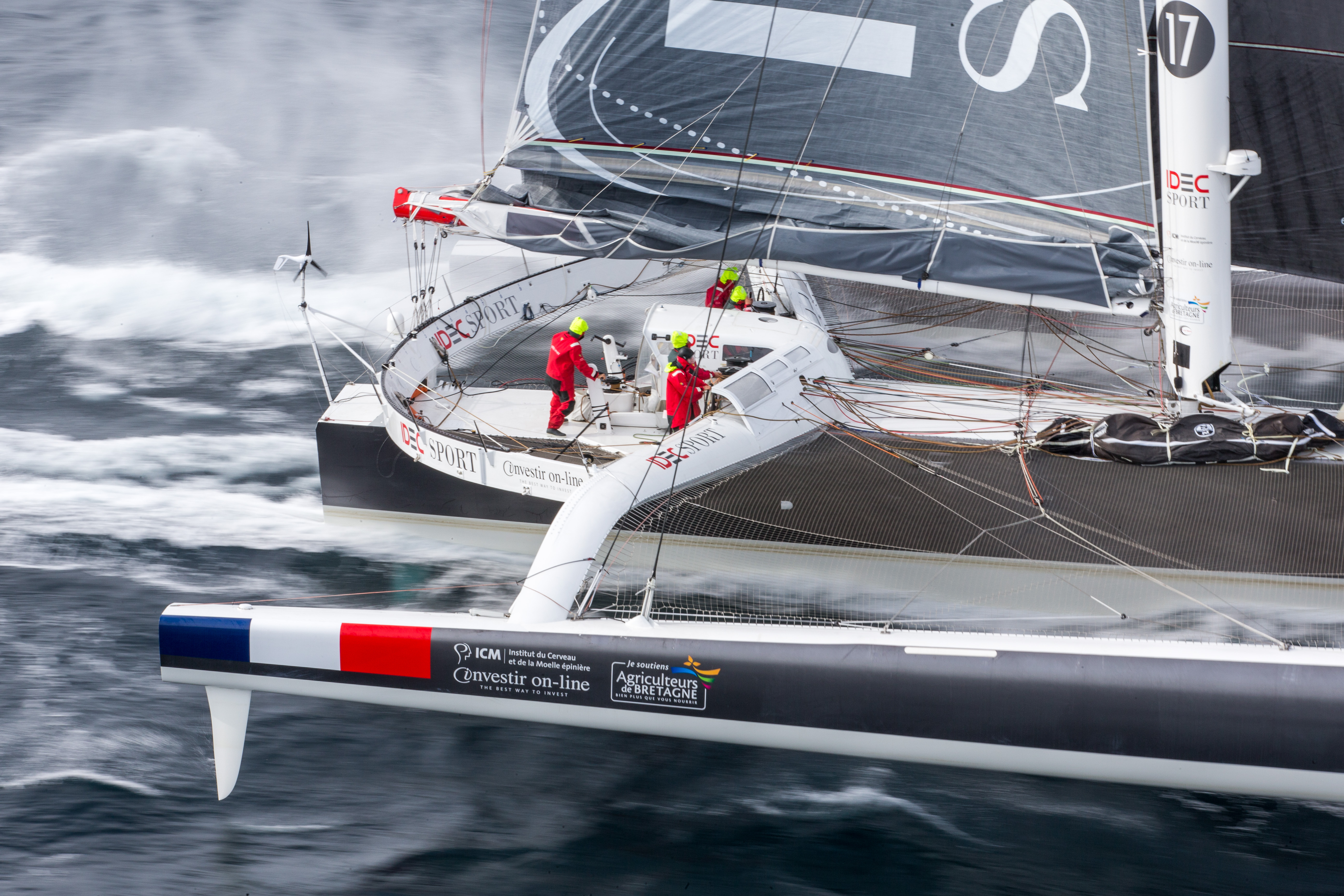
On 27th January 2017, with your crew you improved the Jules Verne Trophy record time. Looking back today, how do you feel about that achievement?
“I’m delighted with it. I’m proud that our little boat and short-handed crew managed to smash the record. It is an even bigger satisfaction after several unsuccessful attempts. This crewed record was very different from what I experienced as a solo sailor, so is a bit like a new career. I have some fantastic memories of this experience. Our crew wasn’t made up of mercenaries for hire, but skilled lads, who each had their own successful projects in the past and knew what it was all about. The total commitment in terms of effort and approach meant that we all did our utmost to get this result.”
What do you think about the new record set by François Gabart, who now holds the solo round the world title?
“It’s a bit tough for us seeing François with his more modern boat get really close to the outright crewed record (laughs). If we hadn’t won the title early this year on IDEC SPORT, François would have set the best time ever, including the crewed record. That is exceptional, especially for a first attempt. I really thought that François would smash Thomas Coville’s record, but not get so far ahead. This year, I raced against François in The Bridge (between Saint-Nazaire and New York) and I was able to see the real potential of his trimaran, which looks incredible. For his round the world record, François adopted an intelligence approach, without piling on the pressure and he sailed perfectly. There are now four of us who have sailed around the world solo on a multihull – me, Ellen MacArthur, Thomas Coville and François Gabart.”
For a long time and on two separate occasions, you held the record (in 2004-2005 then from 2008 to 2016, with a time of 57 days and 13 hours). How do you feel about the fact that records now regularly change hands?
“That is logical. There has been a lot of progress with the boats. Between my former IDEC trimaran and Thomas Coville’s Sodebo Ultim, the speed difference was around 20 %. Thomas’s achievement last year did not surprise me. With François Gabart’s Macif, the potential is even higher and the record was improved. Soon, we’ll see flying boats tackling the records. The level of performance will continue to grow. Our knowledge of the weather has improved too and the quality of the sailors is very high. Everything leads me to believe that the records will be smashed in the coming years.”
A thought for Yves Le Blévec, who just capsized off Cape Horn during his voyage around the world against the prevailing winds and currents…
“Yves is our neighbour on the pontoon in la Trinité-sur-Mer. He too has shown he is totally committed and ready to take certain risks. He had a good start even if it ended up with this huge disappointment. I have been through failures, capsizes, dismastings. I know full well that by overcoming these difficulties, you get to experience better things later. Yves knows how to get back on his feet.”
Let’s look ahead to the 2018 season. The first big date is the Nice UltiMed. What are you aiming to achieve in this event?
“The main goal is to take advantage of the delivery trip and the race course in the Mediterranean to check all the changes made in the yard this winter. We have done a lot of work on the rudders and their foils and on modifying the foils, which should improve the boat’s performance. We are also changing the mast track and mainsail cars and fitting better autopilots for the solo Route du Rhum. Another little detail… we’ll be reinstalling Franck Cammas’s famous bicycle on this boat, which was in place when she was called Groupama 3.”
How do you feel about the Route du Rhum, the big event of the 2018 season?
“I want to set sail with a fast boat, which is light and reliable. It’s going to be an impressive line-up with the new flying boats. I’m fascinated by the opportunity of racing against them. It’s not going to be easy, but I hope to cope thanks to my weather options and perhaps because my boat is more reliable than the others. When sailing solo, the differences in potential tend to be reduced between the boats.”
There is the question about whether the Rhum should allow foils to be adjusted by motor. What is your attitude about that?
“Some teams have asked to use an adjustment system for the foils, to allow them to be set automatically. I am against that to ensure everyone is on equal footing and I have written to the French Sailing Federation to give them my opinion. Allowing foils to be adjusted with less than a year to go to the Route du Rhum would be profoundly unfair. We need to respect the boats that already exist, not give a special advantage to certain teams in comparison to others, who have not had the time to develop this technology. I’m not against the change being made in the future to adopt this principle, but it requires a lot of thought and the energy required must not be supplied by the diesel engines, which will have to be running all the time. We need to favour renewable energy sources: wind turbines, solar panels, hydrogenerators. Our strength is we use sails to propel us. One day there won’t be any more oil, so we should start to look ahead to that. Continuing to use heat engines means we’re not moving in the way the world is going. So let’s set an example to others.”
Titouan Lamazou : “It’s a great day”
Titouan Lamazou, president of the Jules Verne Trophy association, was in Brest on Thursday morning to welcome Francis Joyon and his five teammates. He praised the exploit of the Idec Sport team after its “magnificent victory.” A triumph that will surely whet appetites for more records from other skippers in coming months…
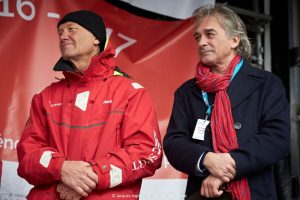
Titouan Lamazou : “This is a great day. We’re always pleased when records are broken The Jules Verne is celebrating its 25th birthday this year. Francis is a great sailor like those, who preceded him, Peter Blake, Robin Knox-Johnson, Franck Cammas, Loïck Peyron… and the others. This is the victory of a crew, which has charmed everyone. They follow in the footsteps of people like Eric Tabarly. They had an exceptional crossing of the Southern Ocean. This is a well-build and well-designed boat and they prepared her well for a short-handed crew. 25 years ago, the goal was 80 days. Now we have to aim for less than 40. We think that lots of sailors will be tempted to try to grab the Trophy that Francis has just won.”
Source : www.idecsport-sailing.com
The fantastic six
Francis Joyon spent the whole day yesterday talking to the media and meeting the public in Brest, where he moored the maxi-trimaran IDEC SPORT after sailing around the world in 40 days, 23 hours, 30 minutes and 30 seconds. Along with his crew of five, he revealed what happened during this circumnavigation. From the magic of a boat appreciated for her ability to sail quickly for a very long time to the lack of hierarchy in the crew and the discreet help from Marcel van Triest.
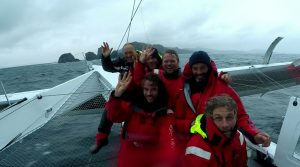
Francis Joyon: “On board, I wanted things to fall into place. It’s vital that the crew pull together and enjoy sailing together. I had a lot of offers, but there were very few places. I chose the human factor. Bernard (Stamm) is almost one of the family and he was the local boy before Sébastien joined us, as he is based in Brest. Clément (Surtel) was key, as along with my son Corentin and myself, he is one of the three members of the team, who worked on the boat. He has the technical know-how that is required. He got on well with Gwénolé (Gahinet), who was part of the team last year and he brought down the average age. The same is true for Alex (Pella) who immediately clicked with me. Sébastien’s arrival was not thought out for as long as he replaced Boris (Herrmann), who is preparing his IMOCA project. Sébastien knows all there is to know about maxi-multihulls.”
“We weren’t aiming for forty days. It was something we couldn’t even have imagined. Beating the record by a minute would already have been an achievement. Some people thought we were having a laugh trying to take up this challenge with such a small crew. It took us about two and a half circumnavigations to beat the record. That is around the same score for all the boats that have attempted the Jules Verne Trophy. Only Bruno Peyron managed it on his first attempt in 1993.”
“In this second attempt of the year, we once again had problems with the Doldrums. But Gwénolé, the eternal optimist, told us things could only get better. By the Cape of Good Hope, we were better placed than in the simulations and then all the doors opened for us. We knew that to beat the record, we would have to stay above 35 knots, which is the speed the front to cross the Indian and a part of the Pacific. We knew that is where the record would be won. We were so motivated that we had several days at around 900 miles. Sometimes, we tried to stay below 40 knots, but we needed to stay ahead of that front.”
Bernard Stamm: “Luck was with us. You have to be lucky for the weather to work out for you. But it was Francis and Marcel, who enabled that luck to help us by setting sail when the weather opportunity appeared. We managed to take advantage of that luck and then go from one system to another. We pushed harder in the Indian. I saw 48 knots at one point, as did my friends. It wasn’t a competition between us. We always did what we could to sail the boat towards the record. Francis placed the cursor lower or higher at times. He was the leader of the band.”
Sébastien Audigane: “Just before the start, I got a call from Francis asking if I’d like to go on board. I had 24 hours to decide. I had to think quickly. I felt at ease with the others, as they too were people, who enjoyed being at sea above all.”
Gwénolé Gahinet: “I joined the project last year for our first attempt. This was something completely new for me. This year, we were better prepared and used to it. It’s fantastic to have found that incredible trajectory and to have sailed so well, particularly in the south with that straight line on the port tack. It required a lot of hard work. It was an exceptional experience and we talked things through a lot, when trimming the boat.”
Alex Pella: “This project was carried out with a lot of freedom for each of us. We all are richer now and learnt a lot from each other. We all respected each other. The feeling was always very positive. It’s not everyday that you get the round the world record.”
Clément Surtel: “Our project adopted a different approach to previous attempts at the Jules Verne Trophy. It was based around being light, rather than power. We performed less well in light conditions, where we would have liked a bigger mast. We have seen recently that flying boats perform well too. In general, it was very physical in the south. It was only once we had got around the Horn that we realised how tired we were by this extreme sailing.”
Marcel van Triest, router, 7th man on board: “From the middle of the Pacific, I could see that the record was possible. But for the past two weeks, I was more in “we could lose it all” mode. There were so many unknown factors and it was very worrying. More than an explosion of joy, it’s more of a huge relief to see them finish.”
Patrice Lafargue, CEO of IDEC: “It’s hugely emotional. I feel overwhelmed, even if I am used to Francis’s achievements. I’m very proud as are my employees to have accompanied him in the Jules Verne Trophy. This small team is made up of real sailors. They are all nice people. I’d also like to congratulate Thomas Coville, who beat Francis’s solo record. An amazing achievement”
Source : www.idecsport-sailing.com
Ovation for Idec Sport team in Brest
Francis Joyon and his five cohorts – the team behind the incredible new Jules Verne Trophy record on Thursday – received a hero’s welcome in Brest. A host of sailing fans and onlookers made the trip out to meet them despite the cold.
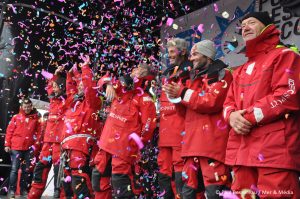
Relive the arrival of Francis Joyon and his teammates, on Thursday morning, in Brest:
Isabelle Trancoen
Joyon and his men shatter the Jules Verne Trophy record
The Maxi Trimaran IDEC SPORT sailed by Francis Joyon, Clément Surtel, Alex Pella, Bernard Stamm, Gwénolé Gahinet and Sébastien Audigane won the Jules Verne Trophy, the outright round the world sailing record, this morning. They crossed the finish at 0749hrs UTC on Thursday 26th January 2017.
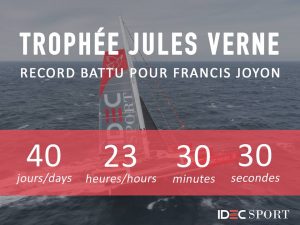
Francis Joyon and his crew sailed the 22,461 theoretical miles in 40 days, 23 hours, 30 minutes and 30 seconds, at an average speed of 22.84 knots. Out on the water, they actually sailed 26,412 miles at an average speed of 26.85 knots.
They shattered the previous record set by Loïck Peyron and the crew of the maxi trimaran Banque Populaire V by 4 days, 14 hours, 12 minutes and 23 seconds. During this round the world voyage, they smashed no fewer than six intermediate records at Cape Leeuwin, off Tasmania, on the International Date Line, at Cape Horn, at the Equator and off Ushant.
Source : www.idecsport-sailing.com
The final 24 hours
As they begin their final full day at sea in this attempt to win the Jules Verne Trophy, IDEC SPORT is heading for Brest at the sort of speeds we have come to expect from her, sailing at full speed on a direct route.
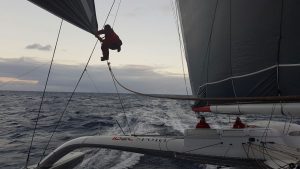
Sébastien Audigane said this morning that they were “climbing up and down the slopes off Lisbon.” 350 miles from Cape Finisterre, Francis Joyon and his men are on the final stretch of their round the world voyage. Sailing at more than 30 knots, they are clocking up the miles and making it look very easy. They are still expected tomorrow morning at the finish line off Ushant, where they will grab the prestigious outright round the world record after just over forty days of sailing.
“Under slightly starry skies, pushed along by a strong southerly, IDEC SPORT is climbing up and down the slopes off Lisbon. We’re on the home strait towards the coast of Finistère. The wind is expected to veer in the Bay of Biscay. The final night of reaching looks rough and wet. For the moment, we are sailing quickly but safely. The seas are not too heavy and we are managing to get some sleep. Everything is fine aboard our mighty race boat.”
Source : www.idecsport-sailing.com
Full speed ahead to Ushant
200 miles south of the Azores, IDEC SPORT is starting the final stretch of her round the world voyage in favourable winds, which they have managed to pick up, getting the timing just right ahead of a front associated with a low-pressure system. With the speedo firmly stuck at thirty knots, Francis Joyon, Bernard Stamm, Alex Pella, Sébastien Audigane, Clément Surtel and Gwénolé Gahinet are on the home strait at the pace they set in the Southern ocean, maintaining high speeds, while remaining vigilant as they face the elements. With 1300 miles to go to the finish, they are now expected on Thursday morning in Brest after forty days of racing against the clock, as they enter the final phase of the Jules Verne Trophy attempt.

“We’re very lucky, as the weather is slotting into place. I think Francis must have spoken to the isobars,” joked Bernard Stamm, who has every right to be pleased, with IDEC SPORT sailing smoothly on the North Atlantic swell under mainsail and gennaker in a 25-knot SSW’ly air stream. Approaching the Azores, everything is falling into place to allow them to continue to keep up the pace all the way to the coast of Brittany, as they sail practically on the direct route, clocking up miles in the most efficient way.
“Taking advantage of the weather that we are being given”
“We are entering a SW’ly air stream. It’s more or less a straight line at full speed to Ushant in strong winds. It’s up to us now to ensure we don’t make any mistakes. We won’t be putting our foot down like we did in the Indian. We want to preserve what we have built up, but it is great to finish at such high speeds. We’re all remaining focused not to take excessive risks with the gear, which needs to work properly until the finish. We are remaining very upbeat about this incredible weather opportunity,” added the Swiss skipper, who is about to finish his sixth round the world voyage.
“At the moment, what counts is going fast all the time to stay ahead of the front,” confirmed Francis Joyon, who is right to feel confident about what lies ahead. “We may have to change tack at some point. We’ll see. We’ll be passing quite close to Cape Finisterre before crossing the Bay of Biscay with the wind and the seas on the beam.”
“An extraordinary boat”
Just like the five crewmen accompanying him on this round the world voyage, he can also count on the qualities of IDEC SPORT and her ability to accelerate and keep up high speeds over long distances. We all remember that they managed to stay on one tack for eleven days, which allowed them to clock up distances in excess of 800 miles a day in the hostile southern latitudes. “We found out a lot about the boat during this voyage. She has made a lot of progress, because her sails are bigger, but also because we now know how to trim her more precisely to gain a few extra knots. She is an extraordinary boat, and is still at 100% of her potential with all her sails operational,” he explained, while remaining well aware of the obstacles that lie ahead and could endanger what they have achieved. “By nature, I am very cautious, and until the line is crossed, we are not out of the woods. There are risks all the way to the finish. But we are well positioned in relation to the low and the weather should allow us to get to Brittany without hitch. We hope to finish in less than two days from now.”
Source : www.idecsport-sailing.com

